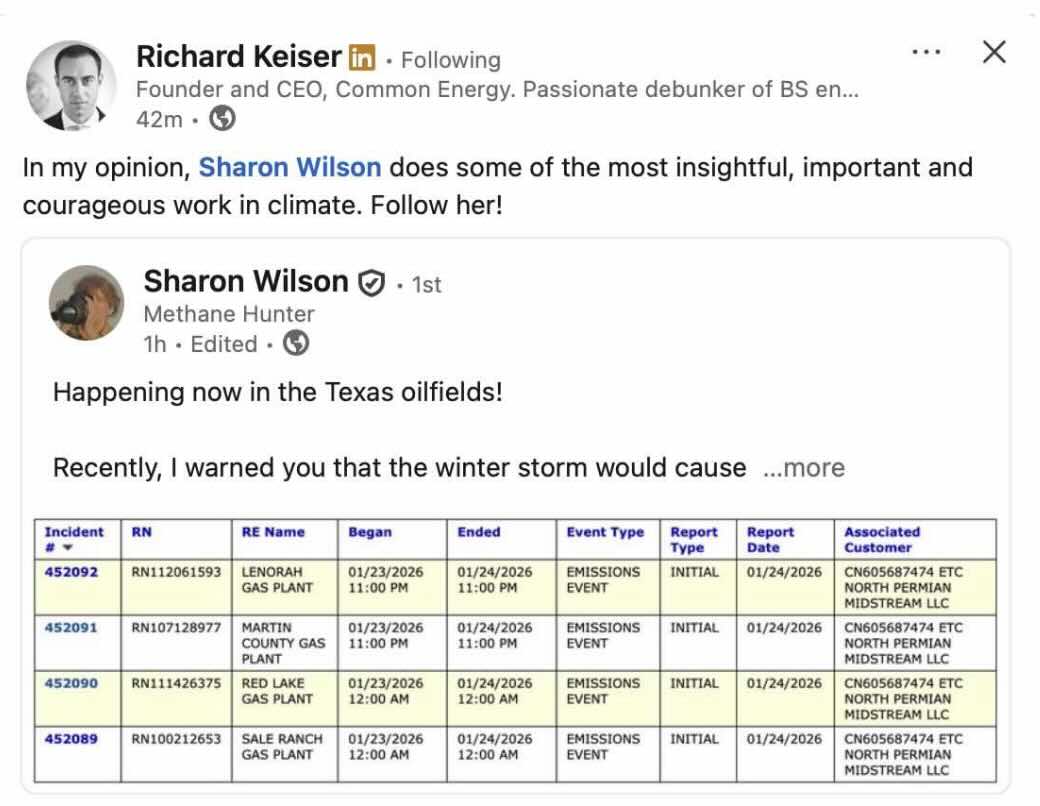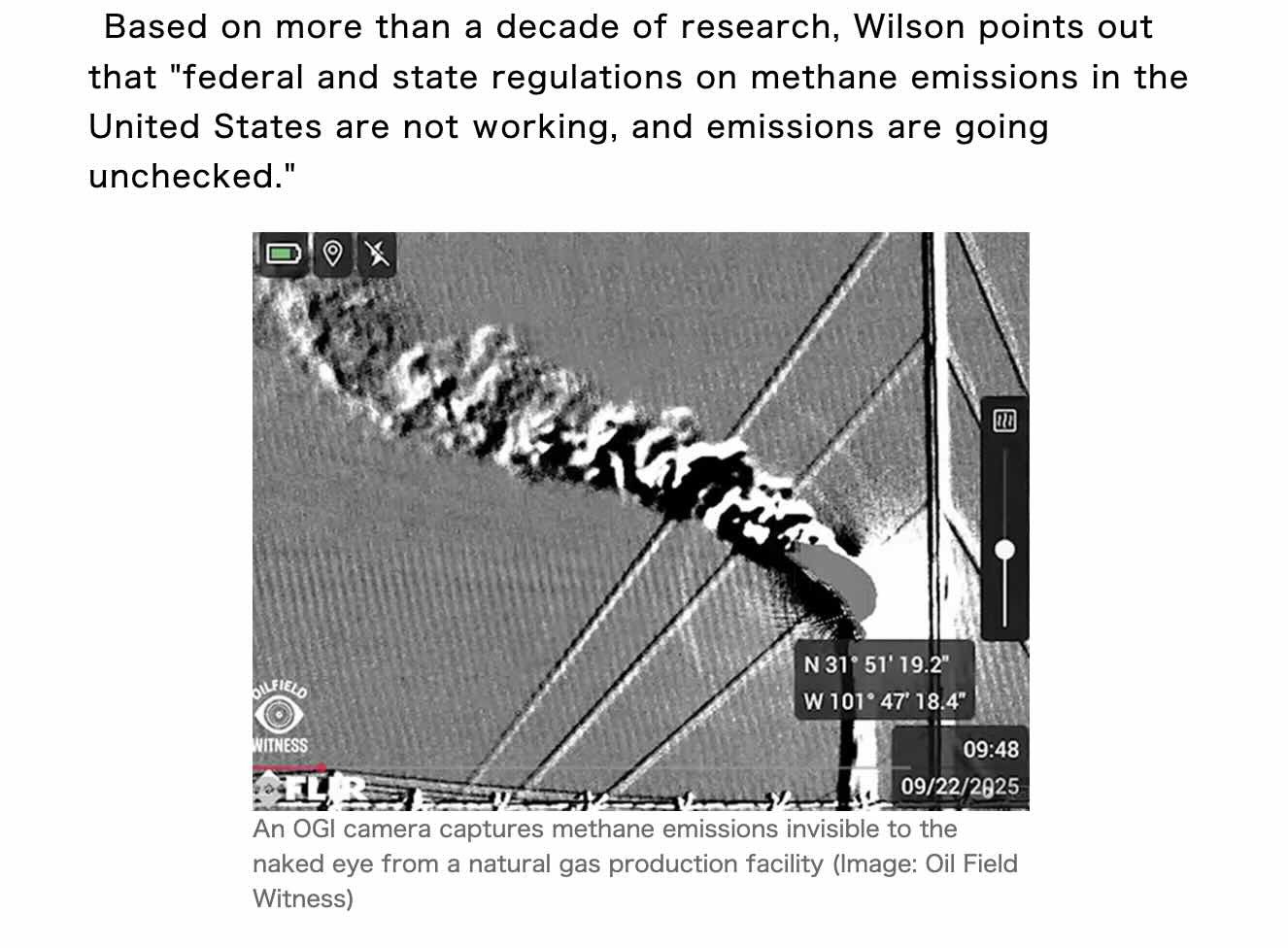News from January
Fern Forces Fragile Fossil Fuel Failures
Prior to winter storm Fern hitting Texas, Sharon wrote about what would happen on LinkedIn. She repeated what she has said for many years. Fossil fuel infrastructure is fragile and fails in extreme weather (hot and cold) and this results in the industry dumping a lot of methane into the atmosphere so their equipment doesn’t blow up. This time people paid attention to Sharon.
The Energy Mix quoted a lot of Sharon’s writing:
“Remember: Oil and gas infrastructure is fragile. Any weather event causes problems,” Sharon Wilson wrote on LinkedIn. “The oil and gas industry cannot survive the extreme weather it is creating.”
E&E News/Politico also quoted Sharon:
“What happens is something goes wrong on a midstream facility and everything upstream of that just blasts out in the air — it becomes over pressured,” said Sharon Wilson, director of the environmental group Oilfield Witness, which uses optical gas imaging technology to track emissions.
Inside Climate News wrote about the storm and quoted Sharon as well:
“The oil and gas industry is too fragile to handle the extreme weather. These releases happen during the extreme summer weather, too.”
— Sharon Wilson, founder of Oilfield Witness
Here is a LinkedIn response to Sharon’s work on this topic.

Our Other Work in the Media
Charlie’s work in New Mexico got attention in January. Starting with a ProPublica article on oilfield liabilities in New Mexico.
Charlie Barrett is an ecologist with environmental group Oilfield Witness who has chronicled pollution at Remnant’s and Acacia’s wells for years. “They’re old, they’re just falling apart,” he said. They are also, he said, emblematic of the small oil and gas operators that represent the final stage of the industry leaving its wells as orphans.
“I wish I could say that it’s unique,” Barrett said, “but it isn’t.”
WildEarth Guardians put out their 2025 Spills of the Year video which featured Charlie’s video of one of the many spills he finds in the field.
Charlie co-authored an op-ed in the NM Repot about oil industry lobbyists in New Mexico.
Like their lobbyists, oil and gas companies are given ludicrous leeway to self-report and police themselves when it comes to compliance with state regulations. In February 2023, satellite images showed a major methane leak from one of ExxonMobil’s Eddy County facilities. The company did not admit to this leak until confronted with these images. This demonstrates why New Mexico needs stronger independent monitoring of its oil and gas companies, as well as stronger monitoring of their lobbyists.
Toyokeizai published an article based on the tour we gave to a group of Japanese media last year which explains the reality of high methane emissions from US LNG to the Japanese public. The translated article headlines is “The Achilles heel of natural gas expansion: the unknown reality of the "methane problem." (it is behind a paywall)

The Guardian wrote about how the rush to power AI is creating a lot of fossil fuel pollution and quoted Sharon in the headline.
“It was jaw-dropping,” said Wilson, a former oil and gas worker from Texas who has documented methane releases for more than a decade and estimates xAI’s Colossus datacentre was spewing more of the planet-heating gas than a large power plant. “Just an unbelievable amount of pollution.”
The Energy Adventurer (Bill Spindle) also wrote about AI pollution and shared our video of the Memphis xAI facility.
The air pollution and emissions from these can be considerable. Here’s a video taken by the anti-fossil fuel activist group Oilfield Witness using a special camera that films the pollutants and release of methane, effectively unburned natural gas.
Energy in Depth (a publication of oil industry lobbyists) took issue with Justin’s quote in The Land of Sacrifice. Notably, their response didn’t address what Justin said. The ProPublica article linked above about “A Fraudulent Scheme” explains what Justin was talking about.
Claim: “[The oil and gas industry’s] business model is to privatize the profits and then socialize the losses… to stick the cleanup bill to the New Mexican taxpayers. This is their ‘take the money and run’ approach.” – Justin Mikulka, Oilfield Witness
Gaslit Documentary
Sharon is featured in the new Gaslit documentary that follows Jane Fonda on a tour of the horrific impacts of the U.S. LNG industry on the people and environment.
Our New Methane Video
We released our new Methane Emergency Brake video. It’s around 100,000 views so far. Please share!
Our Writing
Sharon warned about the impacts of the winter storm on the energy system before it hit on LinkedIn. Charlie also wrote on LinkedIn about the ongoing failure of regulations to control the pollution of the oil and gas industry in New Mexico.
"If we continue to pass incremental policy reforms we will continue to be subjected to a regulatory system that is nothing more than voluntary. As far as mitigation, what good does that do when the state continues issuing permits to an expanding industry in New Mexico? You can't reduce emissions while simultaneously drilling more holes in the ground. I have heard so many people say, "Well this is a good start." Legislators and many environmental groups have been saying this for years. It's as if we are stuck at a perpetual starting point because we are afraid to tell the truth. The truth is, for many species, we have run out time.”
Jack did a deep dive with all the facts on how the latest storm reveals how oil and gas infrastructure can’t handle extreme weather which results in extreme emissions events.
From Thursday, January 22nd to Tuesday, January 27th, the Texas Commission on Environmental Quality (TCEQ) received nearly 70 reports of emissions events. Many of those events were outages at large facilities processing gas from dozens or hundreds of other facilities. The follow on effects of those outages coupled with the many outages that likely went unreported created an estimated loss of several billion cubic feet of gas production (much of which was likely released into the atmosphere) causing a gas shortage that drove U.S. natural gas prices to all time highs. The Texas oil and gas industry apparently cannot handle the extreme weather that its practices are exacerbating.
- Till the end of oil
The Oilfield Witness Team